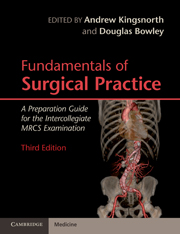Book contents
- Frontmatter
- Contents
- List of contributors
- Preface
- Section 1 Basic Sciences Relevant to Surgical Practice
- Section 2 Basic Surgical Skills
- Section 3 The Assessment and Management of the Surgical Patient
- Section 4 Perioperative Care of the Surgical Patient
- Section 5 Common Surgical Conditions
- 16 Assessment and early treatment of patients with trauma
- 17 Fundamentals of the central nervous system
- 18 Fundamentals of head and neck surgery
- 19 Fundamentals of thoracic surgery
- 20 Oesophago-gastric surgery
- 21 Fundamentals of hepatobiliary and pancreatic surgery
- 22 Fundamentals of endocrine surgery
- 23 Fundamentals of the breast
- 24 Lower gastrointestinal surgery
- 25 Fundamentals of the genitourinary system
- 26 Hernias
- 27 Fundamentals of vascular surgery
- 28 Fundamentals of orthopaedics
- 29 Fundamentals of plastic surgery
- 30 Surgical care of the paediatric patient
- 31 Fundamentals of organ transplantation
- Index
- References
26 - Hernias
Published online by Cambridge University Press: 03 May 2011
- Frontmatter
- Contents
- List of contributors
- Preface
- Section 1 Basic Sciences Relevant to Surgical Practice
- Section 2 Basic Surgical Skills
- Section 3 The Assessment and Management of the Surgical Patient
- Section 4 Perioperative Care of the Surgical Patient
- Section 5 Common Surgical Conditions
- 16 Assessment and early treatment of patients with trauma
- 17 Fundamentals of the central nervous system
- 18 Fundamentals of head and neck surgery
- 19 Fundamentals of thoracic surgery
- 20 Oesophago-gastric surgery
- 21 Fundamentals of hepatobiliary and pancreatic surgery
- 22 Fundamentals of endocrine surgery
- 23 Fundamentals of the breast
- 24 Lower gastrointestinal surgery
- 25 Fundamentals of the genitourinary system
- 26 Hernias
- 27 Fundamentals of vascular surgery
- 28 Fundamentals of orthopaedics
- 29 Fundamentals of plastic surgery
- 30 Surgical care of the paediatric patient
- 31 Fundamentals of organ transplantation
- Index
- References
Summary
Landmarks in the history of surgical management
An appreciation of the history of hernia surgery may prevent us repeating the mistakes of the past and put in perspective the knowledge that has been accumulated in order to allow development of the successful techniques used today. The high prevalence of hernia, for which the lifetime risk is 27% for men and 3% for women, has resulted in this condition inheriting one of the longest traditions of surgical management.
Hernia surgery has a 3500-year history (Figure 26.1)
Castration was an essential part of the earliest operations for hernia, which carried with it an obvious stigma
The Dark Ages until the sixteenth century halted further progress in effective treatment
Femoral hernia was distinguished from inguinal hernia in the fourteenth century.
The great contribution of the surgical anatomists was between the years 1750 and 1865 and was called the age of dissection. The main contributors were Antonio Scarpa and Sir Astley Cooper and few major advances in our knowledge of the anatomy of the groin have been made since this time. The names of these great anatomists are Pieter, Camper, Antonio Scarpa, Percival Pott, Sir Astley Cooper, John Hunter, Thomas Morton, Germaine Cloquet, Franz Hesselbach, Friedrich Henle and Don Antonio Gimbernat.
Information
- Type
- Chapter
- Information
- Fundamentals of Surgical PracticeA Preparation Guide for the Intercollegiate MRCS Examination, pp. 480 - 504Publisher: Cambridge University PressPrint publication year: 2011
